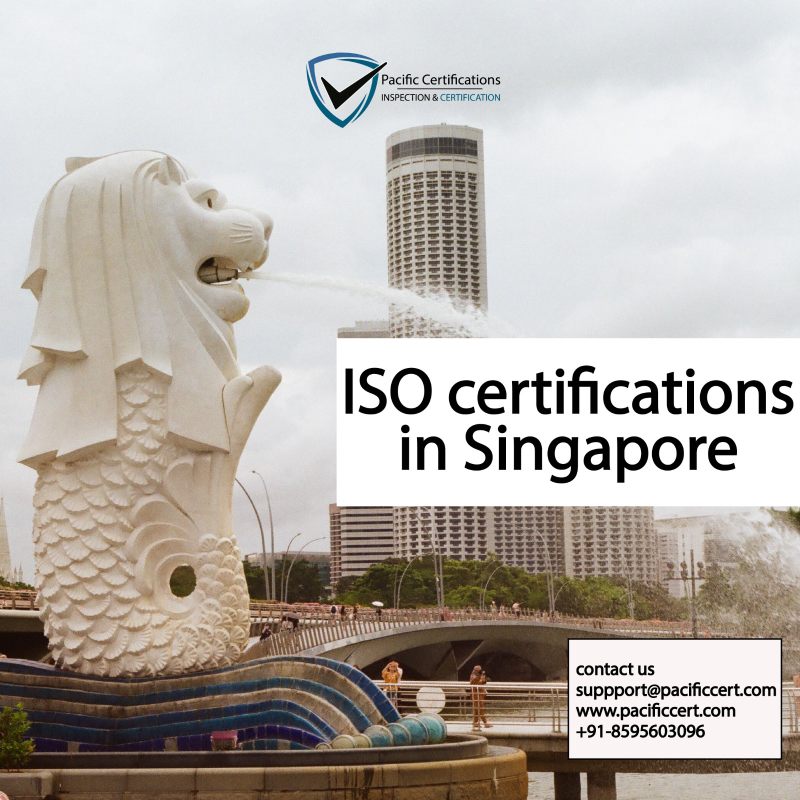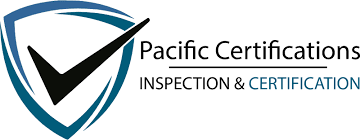ISO Certifications in Singapore, Popular standards, Requirements, Benefits and Popular Standards

ISO Certifications in Singapore
ISO certifications in Singapore are highly valued across industries as they ensure quality, safety, and environmental responsibility. Companies that achieve certifications such as ISO 9001 (Quality Management Systems), ISO 14001 (Environmental Management), and ISO 45001 (Occupational Health and Safety), improve their efficiency and enhance their reputation. These certifications help businesses to comply with regulatory requirements, attract global partners and gain customer trust.
In sectors like manufacturing, technology, and services, ISO certifications also help in boosting marketability and fostering continuous improvement.
For more information on how Pacific Certifications can assist with ISO certification in Singapore, contact [email protected].
Popular ISO standards in Singapore
Below are some key ISO certifications & the requirements for ISO Certifications commonly pursued by organizations in Singapore:
ISO 9001: Quality Management System (QMS):
This certification focuses on ensuring that a company consistently provides products and services that meet customer and regulatory requirements. Requirements include establishing a quality management system, documenting processes, monitoring processes and customer satisfaction, and continuous improvement.
ISO 14001: Environmental Management System (EMS):
This certification focuses on reducing environmental impact and ensuring compliance with environmental regulations. Requirements include identifying environmental aspects, establishing objectives and targets for environmental performance, implementing operational controls, and conducting regular audits.
ISO 45001: Occupational Health and Safety Management System (OHSMS):
This certification focuses on ensuring a safe and healthy work environment. Requirements include identifying hazards and assessing risks, implementing controls to mitigate risks, providing training and awareness programs, and conducting regular audits.
ISO 27001: Information Security Management System (ISMS):
This certification focuses on managing information security risks to protect sensitive information. Requirements include conducting a risk assessment, implementing security controls, establishing an information security management system, and conducting regular reviews and audits.
ISO 22000: Food Safety Management System (FSMS):
This certification focuses on ensuring food safety throughout the food supply chain. Requirements include implementing a hazard analysis and critical control points (HACCP) plan, establishing prerequisite programs, implementing operational controls, and conducting regular audits.
ISO 50001: Energy Management System (EnMS):
This certification focuses on improving energy performance and reducing energy consumption. Requirements include establishing an energy policy, conducting energy reviews and audits, implementing energy performance indicators, and continually improving energy performance.
Click here to find out more applicable standards to your industry
To obtain ISO certification in Singapore, companies need to:
Implement the requirements of the specific ISO standard they are seeking certification for.
Document their processes and procedures.
Conduct internal audits to ensure compliance.
Engage the services of a certification body accredited by the relevant authority in Singapore, such as the Singapore Accreditation Council (SAC), to conduct an external audit and issue the certification.
It's essential for companies to stay updated with the latest requirements and regulations from ISO and relevant authorities in Singapore to maintain their certifications.
Benefits of ISO Certifications in Singapore
ISO certifications offer several benefits to businesses in Singapore, similar to those in other countries. Some of these benefits include:
Enhanced Credibility and Reputation: ISO certifications demonstrate that a company adheres to internationally recognized standards.
Access to New Markets: ISO certifications can open doors to new markets, both domestically and internationally.
Improved Efficiency and Effectiveness: Implementing ISO standards often involves streamlining processes, reducing waste, and improving efficiency.
Compliance with Regulations: ISO certifications help companies ensure compliance with regulatory requirements in Singapore and other jurisdictions.
Enhanced Customer Satisfaction: ISO certifications emphasize customer focus and continuous improvement. B
Reduced Risk and Liability: ISO certifications, such as ISO 45001 for occupational health and safety management, help companies identify and mitigate risks related to workplace hazards.
Attracting and Retaining Talent: ISO-certified companies often have better-defined processes, clear roles and responsibilities, and a culture of continuous improvement.
Overall, ISO certifications can provide significant advantages and contribute to the long-term success and sustainability of businesses operating in Singapore.
Which Industries need ISO Certifications in Singapore?
ISO certifications are relevant and beneficial across various industries in Singapore. Below are some sectors where ISO certifications are commonly used:
Manufacturing:
Industries involved in manufacturing products often pursue ISO 9001 (Quality Management System) certification to ensure consistent quality, ISO 14001 (Environmental Management System) for managing environmental impacts, and ISO 45001 (Occupational Health and Safety Management System) for ensuring a safe workplace.
Construction:
Construction companies may seek ISO 9001 certification to ensure quality construction processes, ISO 14001 for managing environmental aspects of construction activities, and ISO 45001 to address health and safety risks inherent in construction work.
Healthcare:
Hospitals, clinics, and healthcare facilities may pursue ISO 9001 certification to improve quality of patient care and ISO 27001 (Information Security Management System) to protect patient data and confidential information.
Information Technology:
IT companies often pursue ISO 27001 certification to demonstrate their commitment to information security management and ISO 9001 for quality management. Additionally, ISO 20000 (IT Service Management) certification is sought after by companies providing IT services.
Food and Beverage:
Businesses in the food and beverage industry may pursue ISO 22000 (Food Safety Management System) certification to ensure the safety and quality of their food products, as well as ISO 9001 for overall quality management.
Logistics and Transportation:
Companies involved in logistics and transportation may pursue ISO 9001 certification to ensure quality in their operations, ISO 14001 for managing environmental impacts, and ISO 45001 for ensuring health and safety in their workplaces.
Finance and Banking:
Financial institutions may pursue ISO 27001 certification to protect sensitive financial information and ISO 9001 for quality management of their services.
Oil and Gas:
Companies in the oil and gas industry may seek ISO 9001 certification for quality management, ISO 14001 for environmental management, and ISO 45001 for occupational health and safety.
Hospitality:
Hotels, restaurants, and hospitality businesses may pursue ISO 9001 certification for quality management and ISO 22000 for food safety management, among others.
Education:
Educational institutions may pursue ISO 9001 certification for quality management of their educational services and ISO 21001 (Educational Organizations Management System) for enhancing the effectiveness of their educational processes.
These are just a few examples, and the applicability of ISO certifications, it extends to other industries as well.
Contact us
Pacific Certifications is accredited by ABIS, in case you need support with ISO certification for your business in Singapore, please contact us at [email protected] or +91-8595603096
Ready to get ISO certified?
Contact Pacific Certifications to begin your certification journey today!
Suggested Certifications –
Read more: Pacific Blogs

